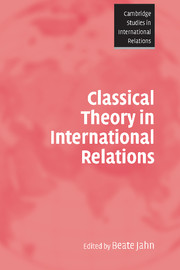1 - Classical theory and international relations in context
Published online by Cambridge University Press: 22 September 2009
Summary
The contemporary world is widely described as globalized, globalizing or postmodern. Central to these descriptions is the claim of historical change or even rupture. A globalized or globalizing world is juxtaposed to an earlier international world just as the postmodern world has left modernity behind. In the light of these claims of historical change it is remarkable that classical authors reflecting on a modern or even premodern, but certainly international, world still play an important role in International Relations.
Three main uses of classical texts in contemporary International Relations can be identified. First, classical authors are frequently cited as precursors to contemporary theoretical approaches: Realists trace the roots of their thinking back to Thucydides, Machiavelli, Hobbes and Rousseau; Liberals most prominently to Kant; the English School to Grotius; Marxist approaches obviously cite Marx as well as Gramsci; and Nietzsche as well as Hegel play an important role in Postmodernism.
Secondly, classical authors are used for the purpose of explaining contemporary political developments and for the justification or even propagation of specific foreign policies. A case in point is the – academically and politically – influential use of Kant in explaining the data of the Democratic Peace and the implicit or explicit propagation of the spread of democracy and market economy accompanied by a strict legal and political separation of liberal from non-liberal states in contemporary world politics.
Finally, classical authors are used to define and structure contemporary theoretical and political debates.
- Type
- Chapter
- Information
- Classical Theory in International Relations , pp. 1 - 24Publisher: Cambridge University PressPrint publication year: 2006
- 3
- Cited by

